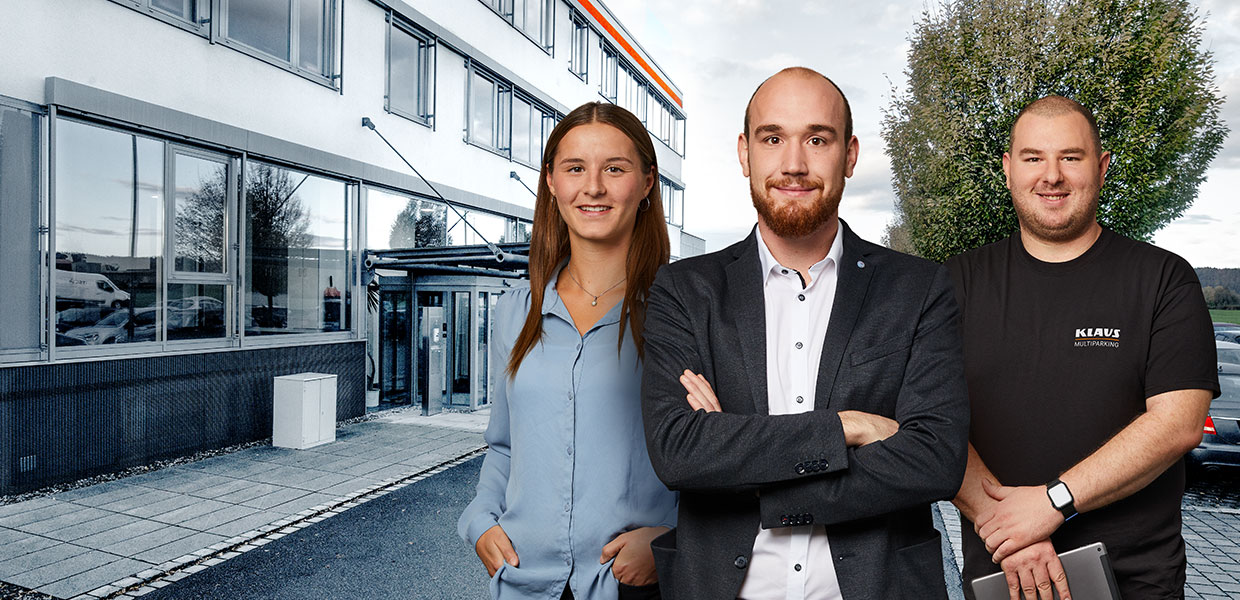60 YEARS OF PARKING INNOVATION FROM AITRACH
Klaus Multiparking has been manufacturing parking systems since 1964
Aitrach (jm).
2024 marks a very special anniversary for Klaus Multiparking: 60 years ago, the company from Aitrach (Baden-Württemberg) introduced its first parking system, the mechanical G1. Since then, Klaus has developed into one of the world’s leading providers of innovative parking solutions, having implemented over 700,000 parking spaces worldwide. Klaus’ solutions range from double parkers and parking pallets to underground parking systems, as well as semi- and fully automatic parking systems. Today, the Aitrach-based company has branches in India, Australia, and the USA and is represented by sales partners in more than 80 countries. Klaus Multiparking employs 200 people in Aitrach.
“We are extremely proud to have been the go-to experts for sophisticated parking solutions for 60 years. We’ve truly earned our reputation as ‘The Original’: Our experts are always thinking one step ahead, tackling tomorrow’s challenges today,” says Ilona Wachter-Gurski, Managing Director of Klaus Multiparking GmbH.
In Demand Worldwide
Builders around the globe trust Klaus Multiparking’s premium parking systems. After the first major parking system boom surrounding the 1972 Munich Olympics, more prominent references for popular series like TrendVario, MasterVario, and MultiBase followed. Examples include the famous skyscraper ‘The Shard’ in London, the ‘Light House’ apartment tower in Melbourne, and the Four-building complex in Frankfurt am Main.
More Than Just More Parking Spaces
Of course, planners and users today have completely different demands for parking systems. “The basic principle of parking systems is to create as many parking spaces as possible in a small area. This is more relevant than ever in times of urban densification, but today it’s about much more than just quantity: Modern parking systems like our TrendVario and MasterVario series also meet contemporary demands for sustainability, comfort, and efficiency,” says Wachter-Gurski.
Integrating Parking Systems, Protecting the Environment
The parking of tomorrow must also be more environmentally friendly, posing major challenges for the construction industry: According to a report by the United Nations Environment Programme (UNEP), the building and construction sector accounts for 37% of global CO2 emissions. Particularly problematic is the use of energy-intensive concrete, such as in multi-story and underground car parks. “We can’t completely do without these structures overnight, especially as the number of new car registrations continues to rise every year,” says Ive Nekic, Sales Director of Klaus Multiparking GmbH.
With parking systems, builders are already moving in the right direction, says Nekic: “By using our parking systems to optimize space, often an entire floor of a car park can be omitted. This significantly reduces the environmental impact and also lowers construction costs and often the time required. This also benefits modern concepts like mobility hubs and neighborhood garages.”
Another environmental plus comes from avoiding unnecessary land sealing: Instead of using large open spaces for parking lots, modern concepts focus on compact and integrated parking solutions. This helps cities and municipalities preserve valuable green spaces while simultaneously creating more room for essential parking spaces, playgrounds, and recreational facilities.
Modern Solutions for Modern Cars
Not only are the number of annual car registrations increasing, but the vehicles themselves are also getting larger and heavier, which must be taken into account in parking space planning. Of the 2.84 million new car registrations in 2023, nearly 1.18 million were SUVs and off-road vehicles. These vehicles are not only larger but also often heavier due to increasingly popular electric drivetrains.
“Cars used to be significantly lighter and narrower. That’s changed now, so as a premium provider, we ensure that users can stack even heavy vehicles weighing up to three tons on top of each other,” says Michael Groneberg from Klaus’ management team.
Protected from Theft and Vandalism
The need for security among vehicle owners has also changed, as with increasing vehicle size and value, the demands for protection against theft and vandalism rise. “Our parking systems provide optimal protection for parked vehicles through additional security features, such as integrated gates on the TrendVario systems,” emphasizes Nekic.
Modern Processes in Production
In its anniversary year, Klaus Multiparking is not only showcasing its parking systems but also its continuously optimized production, which is now more modern than ever. The key: lean management, i.e., streamlining and optimizing production processes.
Two central pillars of the streamlined production are the so-called dynamic storage organization and a reduction in the variety of components: Through increasingly modular designs, fewer custom parts are needed. “This not only saves space but also allows us to respond more quickly and flexibly to customer requests,” explains the managing director.
For him, the optimized production is the next logical step in the company’s development: “In 2016, we invested ten million euros in expanding our operations and automating our production processes. With a leaner organization, we’re now getting even more out of our state-of-the-art facilities.”
The Future is Secure
While many companies in Germany are worried about succession, everything is in place in Aitrach: Since 2019, the experienced leadership duo of Ilona Wachter-Gurski and Michael Groneberg has been at the helm. Together, they aim to continue driving the industry forward as innovation leaders: “In the future, we will continue to prioritize the added value for our customers as our top priority. Our branches in India, Australia, and the USA, along with our wide network of sales partners, will help us to best advise and support our customers worldwide. Our customers can already look forward to it: We will soon unveil our next innovation for the parking space,” says Wachter-Gurski.

